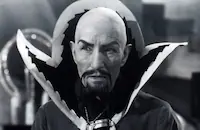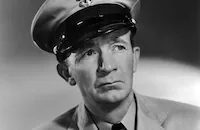Party Wire

Brief Synopsis
Cast & Crew
Erle C. Kenton
Jean Arthur
Victor Jory
Helen Lowell
Robert Allen
Clara Blandick
Film Details
Technical Specs

Synopsis
Matthew Putnam, heir to the Putnam Dairy fortune, returns from Europe to the small town of Rockridge to attend to family business at the request of his bedridden Aunt Nettie. Once in town, Matt visits his old friends, the Olivers, and comments to the father, Will, that his daughter and Matt's childhood friend, Marge, has grown up. The next morning, Marge's jealous beau, Roy Daniels leaves for New York City, telling Marge it is where a man has opportunities. But when Marge has problems balancing the church account books, Matt calls Roy and orders him to return. The local gossips overhear part of the conversation by listening on the party line and assume that Roy is being forced into a shotgun wedding. As a result, Marge loses her job at the Sherman bank because she is labelled a "bad" girl. Marge assumes that the local women are merely jealous of her friendship with Matt. After Marge's entry in the flower show is disqualified, she joins Matt and her family on a fishing trip, during which Matt tells her that he loves her. When Matt returns home, he finds Nettie listening to the party line and she relates the gossip about Marge to him. The next day, Will, armed with a pistol, visits the barbershop and demands to know how the rumors were started. After learning that his call to Roy started the stories, Matt seeks revenge on the town by withdrawing the Putnam accounts from the bank and firing all 300 Rockridge employees from the dairy. When a town meeting is called, Nettie leaves her sickbed to attend and puts the residents in their place by providing unsavory details on the townspeople in attendance. Later, as Matt and Marge are married, the local gossips return to their favorite hobby: listening on the party wire.

Director
Erle C. Kenton
Cast

Jean Arthur

Victor Jory
Helen Lowell
Robert Allen
Clara Blandick
Geneva Mitchell

Maude Eburne
Matt Mchugh
Oscar Apfel
Robert Middlemass
Edward Le Saint

Charles Middleton
Harvey Clark

Walter Brennan
Grace Hale
Joe Smith Marba
Dorothy Bay
Emerson Treacy
James B. "pop" Kenton
Louise Carter
Lillian Harmer
Katherine Clare Ward
Si Jenks
Robert Kerr
Bill Dill
Vester Pegg
George Pearce
James A. Guilfoyle
Jerry Storm
Alfred P. James
Spec O'donnell
Earle Bunn

Lee Phelps
Jessie Arnold
Maidena Armstrong
Adda Gleason
Nelson Mcdowell
Oliver Eckhardt
E. W. Borman
Lafe Mckee
Nat Leffingwell
June Lavere
Stella Lesaint
George Yeoman
Blanche Rose
William Mccall
Sofia Wormser
Charles Cowen
Sam Finn
Ben Hall
Dorothy Shearer
Dolly Bevins
Sammy Blum
Herbert Ashley
Crew
Eddie Blaisdell
Vera Caspary
Harry Cohn
Charles C. Coleman
Stanley Dunn
Evelyn Fontaine
Stephen Goosson
William Hamilton
Ethel Hill
Helen Hunt
Viola Lawrence
John Howard Lawson
Bruce Manning
Robert North
Homer Planett
Dave Ragin
Jack Rea
Glen Rominger
Vic Scheurich
Allen Siegler

Film Details
Technical Specs

Articles
Party Wire
Party Wire is based on a novel of the same title by Bruce Manning whose other credits include screenplays for One Hundred Men and a Girl (1937) staring Deanna Durbin, That Midnight Kiss (1949) with Kathryn Grayson and the Bette Davis vehicle Payment on Demand (1951).
The film stands as one of Victor Jory's few starring roles in a fifty-plus year Hollywood career. Jory got his start acting on stage in 1929. The next year, he launched his film career with Renegades (1930). In another notable lead role, Jory played the title character in The Shadow (1940) a Columbia serial that ran for fifteen installments. His burly look lent itself more to character parts than that of leading man and over the years, Jory was often cast as the villain. Some of his most memorable Hollywood credits include: Oberon in A Midsummer Night's Dream (1935); Yankee carpetbagger Wilkerson who gets a face full of dirt courtesy of Scarlett O'Hara in Gone with the Wind (1939); Helen Keller's father in The Miracle Worker (1962); and Judge Roy Bean in Budd Boetticher's A Time for Dying (1969).
Another familiar face in Party Wire is Charles Grapewin who plays Jean Arthur's father. Grapewin has one of the most unusual backstories in Hollywood. Born in 1869, Grapewin got his showbiz start as a circus acrobat and high wire performer. He eventually graduated to the New York stage, acting, performing in vaudeville shows and even writing plays. Grapewin had retired by the time he decided to give movies a try in 1929; he worked in several short subjects before appearing in his first feature film, The Shannons of Broadway (1929), at sixty years old. He worked steadily through the '30s in films like Alice Adams (1935), The Petrified Forest (1936) and The Good Earth (1937). In the 1940s, Grapewin was in his seventies and still in demand. He played Inspector Queen in a series of Ellery Queen films. There were also appearances in The Grapes of Wrath (1940) and They Died with Their Boots On (1941). But Grapewin would never top his most well-known role -- uncle to Dorothy in The Wizard of Oz (1939).
Finally, there is, of course, the most famous face in Party Wire -- Jean Arthur. Arthur had signed with Columbia just one year earlier, appearing in films like Whirlpool and The Most Precious Thing in Life (both 1934) before hitting on major success in The Whole Town's Talking (1935). The film, starring Edward G. Robinson and directed by John Ford, would send Arthur's career soaring to a new high. Her next film would be Party Wire which captures that moment in time when Arthur's star was on the rise.
Director: Erle C. Kenton
Screenplay: Ethel Hill, John Howard Lawson, based on the novel by Bruce Manning
Cinematography: Allen G. Siegler
Art Direction: Stephen Goosson
Film Editing: Viola Lawrence
Cast: Jean Arthur (Marge Oliver), Victor Jory (Matthew Putnam), Helen Lowell (Nettie Putnam), Robert Allen (Roy Daniels), Charley Grapewin (Will Oliver), Clara Blandick (Mathilda Sherman).
BW-70m.
by Stephanie Thames

Party Wire
Quotes
Trivia
Notes
Although reviews credit Charles Middleton with the role of "Johnson," the CBCS credits Guy Usher.














